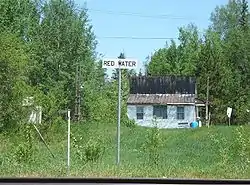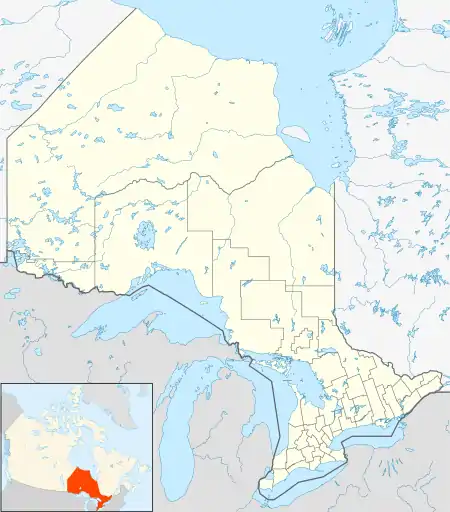Redwater, Ontario
Redwater is an unincorporated place and railway point in the municipality of Temagami, Nipissing District, Northeastern Ontario, Canada.[1] It is in geographic Askin Township and is located on the shores of Lower and Upper Redwater lakes along the Ontario Northland Railway.[2][3] Redwater was the site of a settlement established in the early 1900s that survived into the 1950s.
Redwater | |
|---|---|
 Flat-roofed building and locality sign in Redwater | |
 Location within Ontario | |
| Coordinates: 46°53′47″N 79°38′56″W[1] | |
| Country | Canada |
| Province | Ontario |
| District | Nipissing |
| Geographic Township | Askin |
| Established | 1903 |
| Time zone | UTC−5 (EST) |
| • Summer (DST) | UTC−4 (EDT) |
| Postal Code | P0H |
| Area code(s) | 705 |
History
Origin
The community of Redwater began its formation from a small request stop on the Northern Ontario Railway in 1903 when the railway reached the area of the Upper and Lower Redwater lakes.[4] During this time a small train station, telegraph key, a siding and water tank was constructed.[4] The several men that worked on the railroad either lived in the train station or in a bunkhouse and two houses.[4] At least one of the two houses was used to supply bosses of the crew.[4]
1909 tragedy
.jpg.webp)
The newly formed settlement was the site of a murder in 1909 that began when two railway employees named Cornish and Morin attacked W.J. Dyston who worked as the Redwater telegraph operator.[4] After the attack took place, Dyston had been badly beaten and had to struggle in order to get to the telegraph key.[4] When Dyston reached the telegraph key he managed to call for help.[4] Subsequently, Dyston collapsed onto the telegraph key after he sent an incoherent message and died.[4] It was during this time the name Redwater retained a new meaning for the settlement.[4]
Formation and closure of the Redwater sawmill
A few years after the death of W.J. Dyston, the Redwater Lumber Company constructed a small sawmill in the area.[5] Its lumber yards were located adjacent to Redwater's train station so that the lumber would easily be exported by train.[5] A bunkhouse was created to supply homes for those that worked at the sawmill and subsequent houses were built along the railway.[5] In 1916, a store and post office opened and were operated by a customer named T.J. Baker.[5][4] The Redwater sawmill ceased around 1928 but the community still remained populated.[5] A railroad car was used to supply a school from the 1940s up until the 1950s when at least five homes still existed.[5]
Cessation of Redwater and later years
Because of the closure of the Redwater sawmill, the residents of Redwater only lived there for a time.[5] The post office that opened in 1916 closed in 1942 but the train station still remained in 1945.[6][7] Homes were subsequently destroyed, with the last burning down in the 1950s.[5] In 1957, the Redwater water tower was burnt down.[5] After this took place, a series of cottages were constructed on the townsite in the 1960s and are still used today.[5] Remains of the early ghost town of Redwater are buried under extensive overgrowth and include foundations where the houses were located and a few root cellars.[4] An aluminum shed behind the site of Redwater's original train station is used by the Ontario Northland Railway.[5]
See also
References
- "Redwater". Geographical Names Data Base. Natural Resources Canada. Retrieved 2010-05-29.
- "CLAIMaps IV". Ontario Ministry of Northern Development and Mines. 2016. Retrieved 2017-12-15.
- "Askin" (PDF). Geology Ontario - Historic Claim Maps. Ontario Ministry of Northern Development, Mines and Forestry. Retrieved 2017-12-15.
- Ontario Ghost Towns: Redwater
- Ontario Abandoned Places: Redwater
- "Redwater Station (Historical Post Office)". Rural Routes Ontario. 2017. Retrieved 2017-12-13.
- Surtees, Robert J. (1992). The Northern Connection: Ontario Northland Since 1902. Captus Press Incorporated. p. 204. ISBN 0-921801-83-1.
External links
- "Standard Geographical Classification (SGC) 2006". 3548069 - Temagami. Statistics Canada. 2016-11-08. Retrieved 2017-12-13.
- www.ghosttowns.com - Redwater